Are cranberries the winter superfood we’ve been looking for?
Reported to have an array of health benefits, cranberries are lauded for being rich in antioxidants and vital nutrients. Sue Quinn talks to experts about what this so-called superfood can – and can’t – do for our wellbeing.
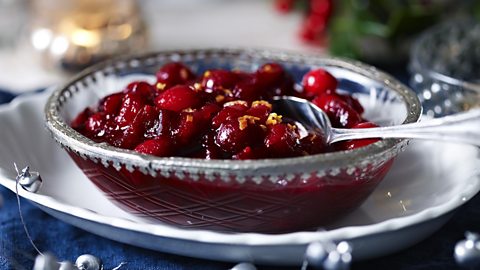
Cranberries, those ruby-red beauties known for their sharp, sour taste, are in season in autumn and winter – a time when we’re looking for ways to support our health and immune systems.
This makes the claims that they’re a ‘superfood’ – one that can help prevent an array of health conditions from urinary tract infections to gum disease – all the more attention grabbing. But does the science justify the excitement?
Superfood status
“‘Superfood’ is a marketing concept used to sell more supplements or foods, by claiming they have lots of beneficial nutrients for human health,” says registered nutritionist Valeria Folco. “However, it is not a legal or scientifically recognised term. No one food can provide us with all the nutrients we need.”
Cranberries’ superfood label stems from the fact that they do contain nutrients and chemicals that are good for us and support our overall health and immune function. A 100g serving of fresh cranberries, for instance, contains 14mg of vitamin C, which is around 35% of the . They also contain small amounts of vitamin B6 and potassium, Folco says.
But it’s the berries’ polyphenols – plant compounds that have been found to be particularly beneficial to our health – that nutritional scientists are most interested in. Specifically, the three types of polyphenols called flavonoids, anthocyanins and proanthocyanidins (PACs).
Roast butternut squash with cranberry relish and feta
Not only do cranberries add colour and flavour to a dish – they’re packed with vitamin C, too
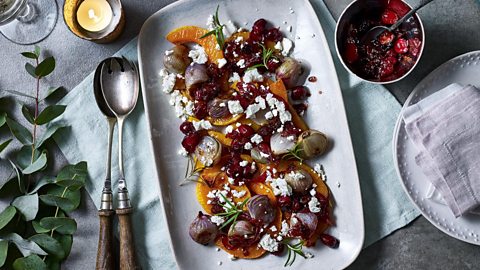
Urinary Tract Infections (UTIs)
Cranberry juice is widely claimed to be useful for managing UTIs, the most common condition seen by GPs .While many of us might question this popular theory, Dr Elisabeth Hodson from the Centre for Kidney Research at The Children’s Hospital at Westmead in Sydney, says there is evidence to back it up.
Dr Hodson recently co-authored a (a rigorous type of research analysis that’s recognised as the highest standard in evidence-based healthcare) into cranberries and UTIs. She good evidence that cranberry juice, tablets or capsules can help prevent UTIs in women who suffer the condition repeatedly, as well as in children (although they didn’t appear to be effective for pregnant women or the elderly).
“The general consensus is that cranberry is not effective in treating a UTI, but is valuable in preventing it in certain groups of people,” Dr Hodson says.
MB zinger
As well as its health benefits, cranberry juice’s tart, fruity flavour adds to its virtues (and makes it a great base for cocktails)
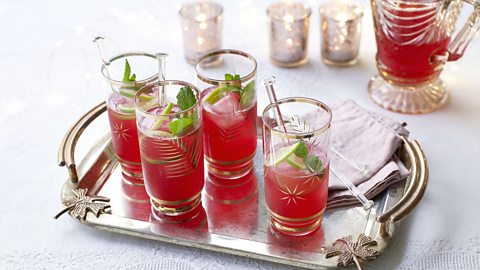
It’s thought the proanthocyanidins (a chemical compound) in cranberries prevent bacteria from sticking to the bladder wall. “If the organisms attach themselves to the lining of the bladder, then they can create infections and cause symptoms,” Dr Hodson says. “But if they can’t attach themselves, then they’re just washed out when the person urinates.”
It’s not clear what the optimum dose of cranberry juice is for preventing UTIs. “A daily glass of cranberry juice is certainly worth trying, particularly for women with recurrent UTIs,” Dr Hodson says. “But it’s probably more effective to take cranberry extracts in tablet or powder form, or you’ll be awash with juice.”
Cardiovascular disease
A number of studies suggest that regular consumption of cranberry juice and prevent the lining of our blood vessels from thickening, which is a risk factor for heart disease.
Dr Ana Rodriguez-Mateos, a nutritional scientist at King’s College London, has researched cranberries extensively. She says there’s that polyphenols in the fruit improve the function of cells in the endothelium – the membrane that lines the heart and its blood vessels.
“In other words, polyphenols can improve the function of our blood vessels. The research suggests that improvements in endothelial function can significantly reduce the risk of cardiovascular disease, even in healthy people,” says Dr Rodriguez-Mateos.
She suggests that “a daily glass of unsweetened cranberry juice, or whole freeze-dried cranberries or cranberry powder in a smoothie, may have heart protective benefits.”
Brain health
Research found eating cranberries may improve memory, help ward off dementia and reduce ‘bad’ cholesterol.
A research team from the University of East Anglia tested the benefits of eating freeze-dried cranberry powder daily – the equivalent of 100g of fresh cranberries – on people aged 50 to 80.
“We found that the participants who consumed the cranberry powder showed significantly improved memory of everyday events,” says lead researcher Dr David Vauzour. Blood flow to parts of the brain that support understanding and learning improved, too.
“The cranberry group also exhibited a significant decrease in LDL or ‘bad’ cholesterol levels, known to contribute to thickening or hardening of the arteries.”
Fresh cranberry sauce
Cranberry sauce is a popular condiment in winter, but could some forms of it help protect our health?
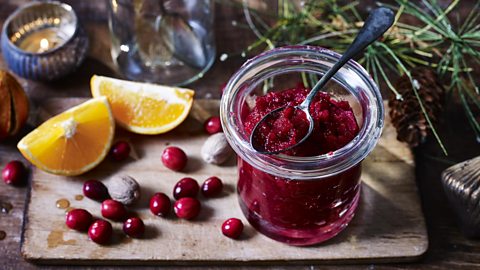
It’s not clear why cranberries have this effect, but the study adds to previous research suggesting those flavonoids may play a part. “Foods rich in anthocyanins and proanthocyanidins, which give berries their red, blue, or purple colour, have been found to improve cognition,” says Vauzour.
Cancer
Some small studies and instances of laboratory research have suggested that certain compounds in cranberries may be useful in the management of some cancers.
Cranberries are the best dietary source of ursolic acid, which is thought may curb the spread of cancer cells, including in .
indicate that the proanthocyanidins in cranberries may reduce inflammation in the stomach and suppress the growth of , a bacteria linked to stomach ulcers and stomach cancer.
But much more research is needed in this field, says Dr Rachel Orritt, from Cancer Research UK. “There isn’t enough evidence to show that cranberries can specifically reduce your cancer risk or help with cancer treatment. Most research to date has been carried out in labs, so it’s not possible to say if this is relevant to humans.”
Cranberry and coconut cereal bars
These bars also include seeds and oats, which have their own health benefits
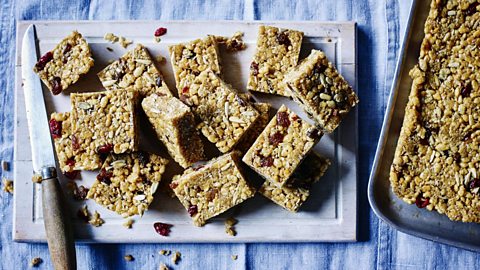
The World Cancer Research Fund states that consuming can help protect against certain cancers. “That’s why it’s important to consume our five-a-day,” Folco says, and cranberries can form part of that intake. One portion is equal to 80g of fresh cranberries (around two small handfuls), a 150ml glass of juice or 30g (one heaped tablespoon) of dried cranberries.
Tooth decay and gum disease
Some suggest the proanthocyanidins found in fruits like cranberries may bacteria that lead to tooth decay. But, again, sound evidence is lacking, says Dr Mick Armstrong, chair of the British Dental Association’s Health and Science Committee.
“There is no definitive evidence to show cranberries represent a silver bullet for oral health. Human studies have been limited, and a recent systematic review found no clear impact on plaque.”
A word of warning
Consuming lots of cranberries or juice isn’t safe for everyone. Although instances are rare, some people are in cranberries, which triggers symptoms like an itchy mouth or tongue, sneezing or a runny nose.
Folco says that cranberry juice can also cause diarrhoea, and that people with kidney stones (or who are at risk of them) should avoid drinking too much of it. That’s because of the presence of oxalates, “which increases the risk of forming new stones,” she says.
People taking blood-thinning medication, such as warfarin, should also avoid the red juice, as it can have a blood-thinning effect. “In general, if you are taking any medicine, it is always advised to check your diet with your doctor, to see if any foods or nutrients could have an effect on your medication.”
It’s key to remember as well that cranberry juice and sauces often contain much more sugar than fresh cranberries, so it’s always best to go for fresh berries or unsweetened juices.
Cranberries in cooking
Aside from their health benefits, cranberries are a delicious ingredient in cooking, whether fresh, frozen, dried or juiced.
An easy way get more cranberries into your diet is to use them in smoothies that use little or no added sugar, or add dried berries to granola or flapjacks.
The tartness of cranberries cuts through rich ingredients really well, making them ideal for this vegetarian nut roast pie. They offer a sharp contrast to fatty meats too, like duck and pork.
Their sourness can also act as a foil to the sweetness of some desserts, like this comforting bread and butter pudding.
If you’re intrigued by cranberries’ potential health benefits, or just want to incorporate more of that sharp and tangy flavour into your food, then now is surely the time – you can find them fresh throughout November and December, and frozen and dried all year.
Originally published November 2023